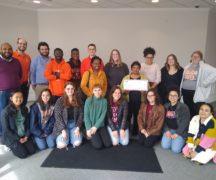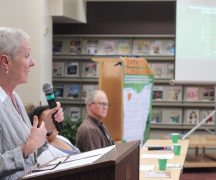By JAN McLAUGHLIN
BG Independent News
Every year, immigrant families come to Bowling Green in search of a new place to call home. They enroll their children in local schools, search for jobs, and study for their driver’s licenses.
This year, there are 38 new immigrant families with children here in Bowling Green, according to Mojabeng Kamala, coordinator of Welcome BG.
“They have so many needs,” and little knowledge of how to navigate the systems here, Kamala said. That’s where Welcome BG comes in as a non-profit organization with a mission to develop and promote Bowling Green as a welcoming, safe, and inclusive environment for all, including new Americans, newcomers, people of diverse backgrounds, immigrants and refugees.
Every year there are also many Bowling Green State University students who come from far away lands.
“They become part of the community,” at least for a brief period, Kamala said.
But efforts to retain those families and those students are slim.
“There are no resources to help people stay,” Kamala said. “We are trying to educate the community that this is something worth investing in.”
Welcome BG previously received funding from the City of Bowling Green, Wood County Commissioners, and BGSU. But the only funding for the program now is from the city, Kamala said.
“That limits what we can do,” she said.
Kamala would love to see community members get involved by stepping up to make immigrants feel welcome in Bowling Green.
“They could support them by getting to know the immigrants living here,” she said.
Welcome BG has reached out and is part of VIBRANT OHIO, a statewide network of local welcoming initiatives that shares best practices and advocates for the economic integration of immigrants and refugees.
By joining that organization, Kamala hopes to see the local Welcome BG office benefit from the partnership’s grant successes.
“We get a piece of the pie,” she said.
VIBRANT OHIO has been selected to join IMPRINT, a national coalition that works to advance policies and programs that support the economic inclusion of immigrants and those who have experienced forced migration.
The coalition has been at the forefront of policy initiatives that address barriers to economic mobility. The IMPRINT coalition is made up of service providers, advocates, and educational institutions committed to advancing policies and programs that support equitable access to opportunity.
“VIBRANT OHIO looks forward to receiving support from IMPRINT coalition on policies that ensure equitable access to opportunity for immigrants and people in our represented cities who have experienced forced migration,” Kamala said.
The organization will be working with the Refugee Advocacy Lab to ensure communities across the country are welcoming for all refugees and other newcomers. In 2024, the lab is focusing specifically in Georgia, Michigan, Minnesota, North Carolina, Ohio, Oregon, Pennsylvania and Virginia.
Lab funding will support each member of VIBRANT OHIO to provide education in their respective communities, Kamala said.
The Refugee Advocacy Lab is an initiative to grow the movement for U.S. leadership on the protection and inclusion of forcibly displaced people. Centered in the perspective and leadership of displaced people themselves, they seek to support the advocacy community by developing strategic communications resources, championing inclusive policies, and building capacity for the field.
VIBRANT OHIO was among the 14 areas selected to join the Skilled Immigrant Integration Program. These areas represent communities that are committed to advancing the workforce inclusion of immigrants and refugees across the U.S.
Launched in 2018, the SIIP Program is intended to improve the situation of the more than two million college-educated immigrants and refugees who are unemployed or underemployed in the U.S. An estimated 60 percent of these newcomers hold credentials earned abroad, according to the Migration Policy Institute. Underutilization of their skills and training results in almost $40 billion in forgone annual earnings and $10 billion in unrealized federal, state, and local taxes yearly. SIIP focuses on identifying and implementing pragmatic solutions that take root in communities.





